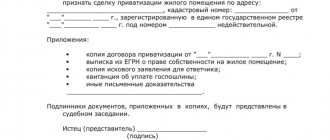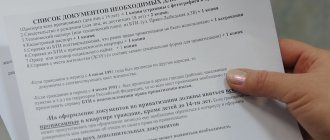Article updated: March 25, 2021
Alexey BessonovPracticing Moscow lawyer
Hello. I am a visiting lawyer from the Bessonov and Partners law firm. I specialize in discharging citizens in court.
In paragraph 1 of Art. 35 Housing Code of the Russian Federation and paragraphs. 5 (f) clause 31 of Government Decree No. 713 dated July 17, 1995, it is clearly written that it is possible to discharge any person from an apartment without his consent only THROUGH THE COURT. This also applies to people who refused to participate in privatization. There is no other way.
It is extremely difficult to discharge such a person from the apartment. After all, having refused privatization, he now has the right to indefinite use (residence) in the apartment. And even if the owner of the apartment has changed - Art. 19 of Federal Law No. 189 of December 29, 2004. But you can try to write it out if certain conditions are met.
IMPORTANT : There are two types of citizens who refuse privatization: 1) Of their own free will, by writing a refusal. 2) They have already spent their right because they participated in the privatization of other housing, but they wrote consent to its implementation. When discharged, these are two identical cases.
Only under these conditions will it be possible to discharge someone who refused privatization
They are listed in paragraph 3 of the Review of Judicial Practice of the Supreme Court for January-July 2014. That is, a “refusenik” can be discharged only when, through his actions, he HIMSELF renounced his right of residence, so he can be recognized as having lost this right.
It makes no difference who the person who refused to participate in privatization is or was the owner - a former husband or wife, son, daughter, parent, grandfather, grandmother, brother, sister, uncle, aunt or a stranger. The conditions are the same for everyone and are considered by the judge in their entirety. I will list them in the form of a chain:
- A person who refuses to participate in privatization does not live in the apartment for a long time - clause 3 of Art.
83 Housing Code of the Russian Federation. Although this article of the law talks about the termination of a social tenancy agreement when leaving a municipal apartment, and our apartment is already privatized, it is applied here by analogy - Art. 7 Housing Code of the Russian Federation. No period of non-residence is established in any official document, but in practice the minimum is 3 years . This is exactly the deadline that I and my colleagues who participate in the courts for the deportation of citizens have determined. We have also read quite a few similar court decisions. If a “refusenik” does not live for 1 year, the chance of being discharged is only 20%. If 2 years - 50%. If 3 years - 90%.↓ - I left the apartment on a permanent basis, and not temporarily due to study, work, business trips, treatment, etc. I took all my things out of the apartment. This is stated in Art. 71 Housing Code of the Russian Federation.↓
- Left voluntarily, and not forced - clause 2 of Art. 1 Residential Complex of the Russian Federation. For example, you cannot discharge a person if he left due to conflicts with the owners of the apartment and proves this. Or is in prison. You can, of course, submit the court verdict to the passport office and it will be “formally” issued. After leaving prison, he can register back without any problems. Even the new owners won't sign him out. I wrote about this at the very beginning of the article.↓
- He does not pay utility bills, does not participate in the repair and maintenance of the apartment for at least 3 years (clause 4 of article 69 of the Housing Code of the Russian Federation). This period is similar to the minimum period of non-residence.↓
- He did not try to move into the apartment again, and if he tried, he was NOT prevented from doing so.↓
- It is better that all owners agree to the discharge of a “refusenik”. If one of them is against it and reports this in court, there is a high probability that the judge will reject the claim.
How to obtain information from the Unified State Register of Real Estate online?
In order to obtain the necessary information, you must have access to the Internet.
- Go to the official website of Rosreestr.
- Register in your personal account.
- Click on the “Electronic Services and Services” tab.
- In the list of electronic services, find “State registration of rights”.
- On the right side of the site, find the name of the service “Extract from the Unified State Register of Real Estate on the rights of an individual to his real estate properties.”
- A request form will appear in front of you. You need to enter information about the subject, the type of object, indicate the period, as well as information about the possible copyright holder.
- You must select a method for providing information from those offered.
- Enter the code from the image and click on the “Go to applicant information” button.
- After a long download, if information about you is actually available on the resource, it will appear in the appropriate window.
- If you are not the owner of any real estate, this means that you can actually participate in the privatization procedure on a general basis.
Why are you more likely to win your case with a lawyer?
If all the above conditions are met, this is good, but only half the battle. The main difficulty is that in court you need to PROVE everything in WRITTEN. The judge will not believe the words and arguments. In practice, the judge will initially be on the side of those who refuse privatization.
To prove it to the judge, you need to provide him with certain certificates and acts from various government departments/organizations in advance. An ordinary citizen, of course, can send requests, but they will still not be answered. Because they don't have to. It is better to entrust this to a lawyer. He, having the status of a lawyer, can make legal requests for the necessary organizations - paragraphs. 1 clause 3 art. 6 and paragraph 5 of Art. 6.1 Federal Law of May 31, 2002 No. 63-FZ. And organizations are obliged to respond to requests from lawyers, otherwise they face a fine - Art. 5.39 Code of Administrative Offences.
A lawyer will study your situation and send requests to those organizations and departments that are beneficial to you. The lawyer himself will draw up a request, send it and collect answers. Then, from the received answers, it will select the most useful ones. I have provided sample answers in the instructions below.
If you do not contact an attorney, you can ask the judge to send inquiries by organization. The judge will formalize the requests, but will offer you to take them to the organizations, plus pick up the answers when they are ready. He will offer it, but he has no right to force it. And you will no longer have the opportunity to adjust more profitable requests for your business. And you will no longer be able to filter out the responses received and discard unnecessary ones. In addition, you will not know some of the answers because they will be sealed in envelopes. All this reduces the chances of discharge to zero.
It is much more profitable to hire a lawyer and have a better chance in court, because no one will want to deal with such a problem apartment. For example, no one will want to buy such an apartment. After all, those who refuse to participate in privatization have the right to live in the apartment even if the owner changes - Art. 19 of Federal Law No. 189 of December 29, 2004. Buyers do not need such problems.
Our law office "Bessonov and Partners" offers residents of Moscow or the region. We will take on all the possible work - we will draw up a correct statement of claim, collect all the necessary documents and submit them to the court. You will not need to come to court hearings; the office's lawyer will participate in them and will do everything possible to win the case. At the end of the trial, we will bring you a copy of the court decision.
We have been working in the field of court records since 2008 and have won 84% of court cases.
The cost of the service is 60 thousand rubles. For visitors to this site there is a discount from 5% to 10%. To receive it, say that you came from the website “Prozhim.com”. For all questions, please call 8 (916) 594-57-31 (daily from 9:00 to 21:00 Moscow time / only for residents of Moscow and the region).
How to check?
There are many ways to find out whether you have participated in the privatization of an apartment before or not. However, many nuances depend on which authority you are contacting . In the following paragraphs we will look in more detail.
Where to go?
There are several institutions where you can contact.
- First of all, the BTI owns such information.
- There is also a way to find out about privatization via the Internet.
- The corresponding extracts from the Unified State Register are provided by Rosreestr.
- In addition, you can contact a private organization that will provide the required information for money.
Required documents
- A document proving your identity, as well as, if necessary, the identity of your roommates.
- Birth certificate of the child, if he is participating in the procedure.
- Photocopies of the above forms.
- Application for obtaining information about the possible fact of your early privatization.
- Certificate from the BTI or passport office about your places of residence for the last 10 years.
Upon request, other documents can be provided, for example, a power of attorney if it is not the owner who is trying to obtain information.
State duty
A certificate from the Unified State Register is a paid service. In order to receive such a document, you must pay a state fee according to the details that relate to the branch of Rosreestr where you are applying. The certificate is issued in both written and electronic format.
Reference! The state duty is 400 rubles. in printed format. An electronic statement will cost less, 250 rubles.
Watch the video: Step-by-step instructions on how to privatize an apartment
How to privatize an apartment: step by step
Deadlines for receipt and validity
The period for receiving extracts from Rosreestr is standard and is up to 7 calendar working days. If the waiting time falls on weekends or holidays, the period will increase. Also, the period may increase if you delay the provision of necessary documents or difficulties arise with archival data and requests are made to the relevant institutions.
The Rosreestr employee must justify to you the reasons for the delay, and, if necessary, issue the relevant documents.
Which residential address to indicate?
Here I will answer the following questions: “I don’t know where the “refusenik” lives now, what address should I indicate in the statement of claim? And if it is known, then indicate the actual address?”
According to judicial practice, the defendant’s residential address is considered to be his registration address - paragraph 63 of the Resolution of the Plenum of the Supreme Court of June 23, 2015 N25. Therefore, in the statement of claim, we enter the residence address of the “refusenik” as the address of registration - the apartment from which we want to discharge him. The plaintiff is not required to know where the defendant actually lives. Often he doesn't even know about it.
As a result, all subpoenas will be sent to the defendant to the apartment address - Art. 113 Code of Civil Procedure of the Russian Federation. If he does not receive them (because he does not live there), the court will still consider him notified. According to the law, the court did everything in its power to notify the defendant. Receiving correspondence is a citizen's responsibility. If he does not appear in court, the case will be considered without him (in absentia) - clause 4 of Art. 167 Code of Civil Procedure of the Russian Federation. This is to the advantage of the plaintiffs, because he will not be able to protect his interests.
How to find information by address if there is no information in Rosreestr?
How to check the privatization of the apartment in this case? If there is no data in Rosreestr, then there are other ways to find out information about the fact of privatization of an apartment.
Receipt for payment of utilities
This method will help if you don’t have time to wait a long time for the result from Rosreestr.
- Take the receipt that you receive monthly to pay utility bills at the address of the apartment whose privatization information you are finding out. The type of housing will be indicated at the top below the calculations.
- Depending on the form of the receipt, the information may be located a little lower. This line will indicate whether the property is privatized or not.
Important! You shouldn't trust this method too much. Unfortunately, sometimes data in utility organizations does not change for years or is simply not updated, and you may be misinformed.
BTI
The Inventory Bureau has a huge amount of data contained in archives.
- You need to go to your local bureau office with the necessary papers.
- Fill out the application according to the sample, making sure to indicate the address of the property you are interested in.
- Provide your passport.
- A written application is sent for consideration.
- After this, after a few minutes to several days, you can receive documents confirming or refuting the status of a privatized apartment.
Settlement center
A settlement center is a so-called intermediary, which is appointed between the state and individuals in real estate transactions. The settlement center also provides other services, for example, providing information about whether the apartment has been privatized or not. In order to obtain information in this way, you need to:
- Create a package of documents. It will include your passport, as well as an application, which is drawn up according to the clearing center form. The application indicates the address of the property you are interested in.
- Then you must report to the department of the above-mentioned institution.
- Submit your request to a member of staff.
- Wait for the verification, and then wait for the information to be given to you. Typically, this will take from a few minutes to several hours.
Reference! If the settlement center does not contain information, it is possible that the data was not entered in a timely manner. The service at the settlement center will cost you from 200 to 250 rubles.
The ability to obtain the necessary information in a timely manner, and most importantly, independently, is a great way to always be aware of the state of things around you. We hope that the instructions were clear to you, and you can easily put them into practice by choosing the optimal one.
Useful video: 5 stages of apartment privatization, documents, features and deadlines for receipt
Documents for privatization of an apartment - features and terms of receipt.
If you find an error, please select a piece of text and press Ctrl+Enter.
In favor of whom?
Such wording as refusal to participate in registration of property rights is not provided for by law. It is possible to declare one’s non-participation by submitting an application, but it is impossible to specifically benefit someone.
Here it is important to solve everything collectively, within the family circle. If parents want the home to initially become the property of their child, then it is reasonable for both of them not to take part in the procedure.
When there is an intention to transfer most of the real estate to one of the family members - for example, in a family of three, the father refuses to participate, but on the condition that the son gets 2/3 and the mother 1/3, then his condition does not appear anywhere in the documents.
It is necessary that the mother and son, with mutual agreement to comply with the father’s requirements, announce to the relevant specialists the decision to divide the living space in this way.
Most often, when one of those registered does not participate, the entire living space is divided in different shares among all other family members.
If you have a great desire to give one relative a larger share, the wisest thing to do is to take advantage of the right and take ownership of part of the housing, which after completing all the papers, give it to your pet.
Find out on our website about the rights and obligations of the owner and those registered in the privatized living space, as well as the statute of limitations for invalidating the privatization of real estate.
Features and nuances
There are particularities in this issue that concern permanently registered children: they are treated especially closely. If the child is registered, then he must certainly be included in the contract.
It happens that a minor child is assigned another living space, in which it is planned to involve the child as a participant in the registration of property, then a waiver must be drawn up on his behalf.
Legal representatives, which include parents, adoptive parents, and guardians, have the right to decide important issues for children before they reach the age of 14.
In addition, Art. 28 and 37 of the Civil Code of the Russian Federation require that this document - consent to non-participation in the acquisition of real estate in the form of an apartment - must be confirmed by representatives of the PLO.
Therefore, first, parents need to obtain permission from the guardianship authorities, and only then go with this document to the notary for a refusal.
But you should know in advance that it may take about two weeks for the guardianship authorities to review and make a decision.
If the child is already 14 years old, then he or she takes part on a general basis.
Find out about the procedure for deprivatization, as well as re-privatization of residential premises on our website.
Documentation
To work as a notary, only one passport of a person who has decided not to get involved in the process of taking possession of the living space is enough.
There is a condition - the mandatory presence of permanent registration at the address of the residential premises in question. It is advisable to take documents for the property so that the specialist can be convinced that the housing still belongs to the state.
How to apply correctly? The paper, called a “refusal” or “statement”, is called in jurisprudence “agreement on non-participation in privatization”.
The notary is obliged to type into the form all the information about the citizen who applied, as well as explain to him what his decision means for him, and then certify the signature.
In the middle, in large font, write the name of the document, below – the name of the locality, the date of preparation.
The application is written on behalf of the first person that citizen such and such, indicating his passport details, as well as the presence of registration at such and such an address, agrees to the privatization of living space at the same address, without including it in the contract.
Further it must be indicated that this citizen knows that the real estate will be owned by such and such citizens (indicating all full names), and that he is aware of all the consequences of the act. Below is the signature of this person with a transcript, and its notarization.
The author of his idea must add his refusal, along with his passport, to the rest of the papers of the whole family.
When all the documents on the mandatory list have already been collected, all participants (excluding the one who filled out the paper on non-participation) need to come to the Housing Department of the local government and submit a set of documents for drawing up an agreement.
When the agreement is signed, it should be registered with Rosreestr, after which the living space is considered to be one’s own, and not state-owned, which must be confirmed by cadastral registration with the State Property Committee.
Causes
Non-participation in the legal process of acquiring real estate must be justified by the presence of some compelling reasons, which include:
- painful condition, with confirmation from a specialist from a medical institution;
- lack of documents in the required volume;
- the desire to make one of the household members the sole owner of the premises, etc.
It happens that just at the time of registration, one of the residents’ passport is not in order - the date for pasting in the photograph has expired, for example, the document cannot be considered valid, and the person will have to not take part by writing a statement of the appropriate form.
You can find out whether it is possible to privatize real estate with debts, company housing or cooperative housing, as well as military premises, a room in a communal apartment or a dormitory from our articles.
Timing and cost
The legal deadlines, defined as 60 days (Article 8 of the Law “On Privatization”), in fact cannot always be met: questions often arise that require additional information, obtaining papers about which will require an extension of the deadline, sometimes the process can drag on for 3-4 months .
The procedure itself is free, but many of the papers will require not only time, but also money. The state duty is 2,000 rubles, but not for each potential co-owner, but for residential premises, and is calculated in accordance with the size of the share, so that the total amount is exactly equal to two thousand rubles.
Read our article about the cases in which a negative response may be received from the authorities when registering for personal ownership of real estate.






